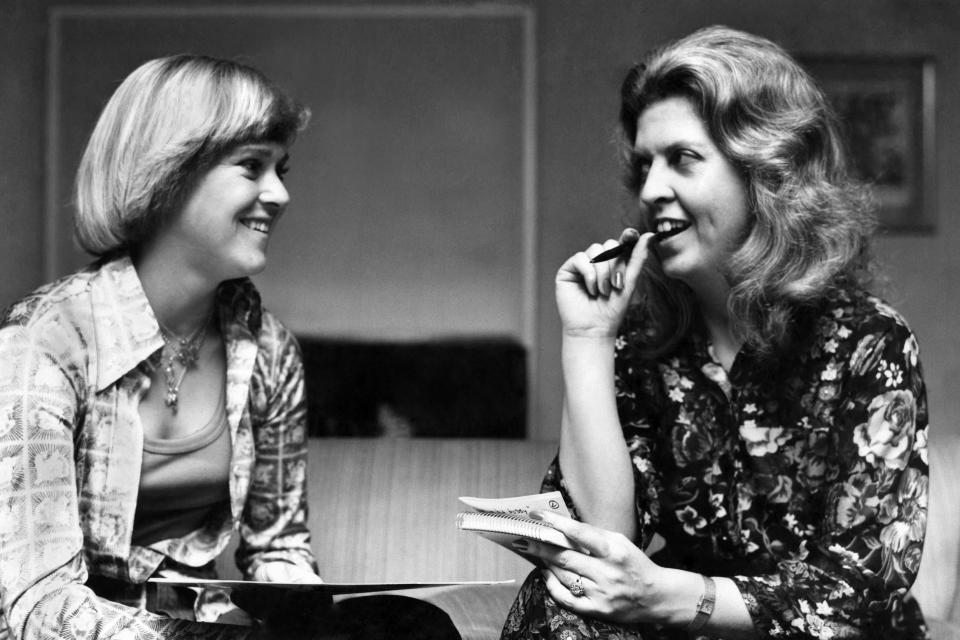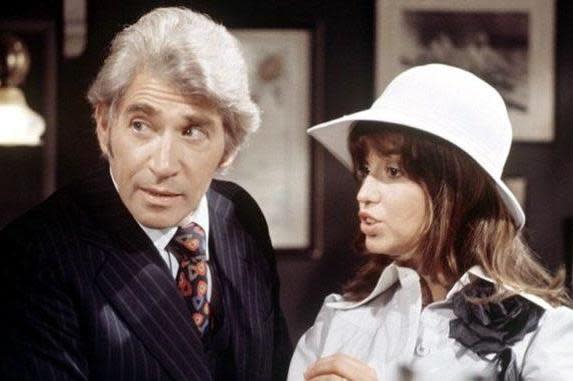Andrea Newman: Novelist and screenwriter who made her name with taboo-breaking TV drama

Andrea Newman, who has died of cancer aged 81, was a screenwriter and novelist best known for outre television dramas such as Bouquet of Barbed Wire, a tale of twisted sexual encounters in a dysfunctional family.
The producers described the 1976 serial, which drew audiences of up to 20 million, as “a modern Greek tragedy”. Adapted by Newman from her 1969 novel, the serial starred Frank Finlay as wealthy publisher Peter Manson, who looks at his manipulative pregnant daughter Prue (played by Susan Penhaligon) with a gaze that suggests thoughts of incest.
Prue’s American husband, Gavin Sorenson (James Aubrey), who beats her, is welcomed into the bed of her mother, Cassie (Sheila Allen), before Prue dies in childbirth. Meanwhile, Peter has an affair with his secretary, Sarah (Deborah Grant).
The 1977 sequel, Another Bouquet – in TV and book form – saw Peter also sleeping with Gavin’s new girlfriend, Vicky (Elizabeth Romilly), alongside other machinations and permutations.
Infidelity was a theme that ran throughout Newman’s work. “I have been cheated on and I have done the cheating,” she said. “I have been dumped and I have done the dumping. I guess it evens out.”
The writer was born Gillian Werts in Dover, Kent, in 1938, the only child of George, a newspaper reporter and photographer born in India, where his father served in the British army, and his wife, Brunnhilde (née Spooner), a secretary born in Jamaica.
A maternal great-grand-niece of poet Elizabeth Barrett Browning, she adopted the pen name Andrea Newman on the publication of her first novel and never revealed her birth name.
She and her mother lived in Shropshire during the Second World War, when her father used his photography skills as a flying officer with the RAF. The family then moved to Cheshire and, after graduating in English from London University in 1960, Newman spent 18 months as a civil servant before teaching at Tottenham High School for Girls, north London. During school holidays, she wrote novels, beginning with A Share of the World in 1964.
Her fourth book, Three into Two Won’t Go (1968), captured the spirit of the new freedoms of the Swinging Sixties. This tale of a middle-aged man torn between his love for his wife and his infatuation with his teenage lover, and the realisation that the latter is carrying his child, became a 1969 film adapted by Edna O’Brien, with Peter Hall directing and Rod Steiger, Claire Bloom and Judy Geeson starring.

Newman left teaching and continued to write while gaining an MA in English from London University in 1972. By then, she had written her first script for television, “It’s Too Late Now” (1970), part of ITV’s anthology series Tales of Unease.
In 1972, while one of her short stories, “She’ll Be Company for You”, was turned into an episode for the Night Gallery strand of horror tales, she was asked to adapt another herself – “The Night of the Stag” for The Frighteners slot, screened the same year.
This was followed by a fresh commission, writing a 1973 episode of Love Story in which a 13-year-old girl showers her attention on a middle-aged man. It was a hint of what Newman would bring to TV in her own full-blown creations.
Among her other one-off contributions to popular drama were two episodes of Helen: A Woman of Today (1973), about a thirty-something mother leaving her cheating husband to study and become self-sufficient.
Newman gave a copy of her novel A Bouquet of Barbed Wire (the title lost its indefinite article when it was made for TV) as a thank-you present to Tony Wharmby, who directed one of those episodes, and he saw the potential for a screen version.
The drama – and its sequel – established Newman in her own right. Next, as both a TV serial and novel, came Mackenzie (1980), another inter-family saga starring Jack Galloway as a Scottish builder having affairs after moving to London with his reluctant wife in tow.
The theme of infidelity featured again in Alexa (1982), which Newman adapted from her own 1968 novel about a man cheating on his wife when her friend moves into their flat, and A Sense of Guilt (1990), starring Trevor Eve as a middle-aged novelist seeking inspiration for his stories by having an affair with the teenage daughter of his best friend – with damaging consequences.
Eve played a similarly sexually manipulative character in Newman’s 1999 drama Evil Streak, as a scheming English professor enticing his married niece into an affair with an out-of-work actor.
Less successful were Imogen’s Face (1998), following two sisters and their differing fortunes in life and love, including the inevitable affair, and Pretending to Be Judith (2001), with an antique jewellery dealer paying an actor-turned-sex worker to impersonate his recently deceased girlfriend.
Newman was diagnosed with breast cancer in 2004. She turned down the opportunity to script a 2010 Bouquet of Barbed Wire remake, starring Eve as Manson.
In 1959, while at university, she married Terence Nolan. They were later divorced.
Andrea Newman, writer, born 7 February 1938, died 9 November 2019
Read more
Alison Prince: Children’s author whose big break came with Trumpton
Stephen Moore: Seasoned character actor who shone in comedy and drama

